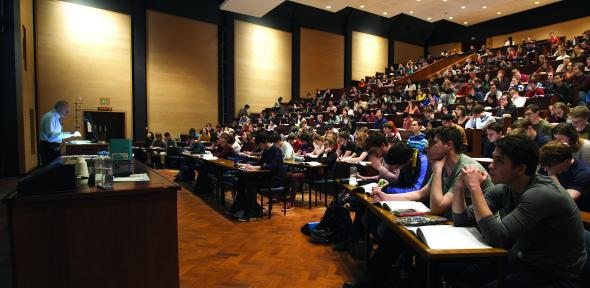
At Cambridge, you’ll be taught by inspiring teaching staff who are experts in their fields.
What to expect from teaching at Cambridge
- Excellent teaching that’s respected around the world.
- Personal tutorials through our supervision system, from the start of your course.
- Support to help you adjust to the workload.
How you’ll spend your study time
Most of your teaching will take place in-person. So, you’ll need to be available to study in Cambridge.
Our terms are short and busy. You’ll spend your time studying independently and in organised teaching sessions (known as contact time).
The number of hours you spend studying each week will depend on your course. But you can expect to spend a minimum of 35 hours per week on independent study and contact time. In some cases, this might be significantly more.
It can take time to adjust to your new workload. But there are plenty of people who can offer advice and support while you get settled in and throughout your degree.
During the vacations, you’ll need to continue with some academic work. For example:
- further reading
- research
- revision
- assignments
You’ll also benefit from our exceptional study spaces and facilities.
Department and College teaching
You’ll be taught through:
- supervisions, arranged by your College
- larger group teaching, organised by your department or faculty
Check your course page for information about contact hours and types of teaching in your course.
Supervisions
At Cambridge, you’ll be taught through personal tutorials, known as supervisions.
A supervision is a small group discussion about the topic you're studying. It will be led by a specialist (a supervisor) in the subject area.
Supervisions usually last an hour. The number of supervisions you have each week will vary depending on which course you're studying. You can find details on our course pages.
You will prepare by reading, writing an essay or working on some problems.
Benefits of Cambridge supervisions
- They aren't assessed, so you can test your ideas and interests.
- You can ask questions and get support.
- You'll get regular feedback on your work.
- You will usually work with a different supervisor for each area that you study. They may be a world leading or national authority on a topic.
Watch our Guide to Supervisions video.
Other Cambridge teaching methods
Lectures
- Lectures are often given by leading academics, working at the cutting edge of research.
- They usually last around 50 minutes.
- Up to several hundred students may attend, depending on the subject.
Seminars and classes
Classes and seminars are used to discuss topics in detail.
Discussions are led by academic staff, but you're expected to take part. You may be asked to prepare a presentation.
Classes and seminars are usually:
- for a group of 10-30 students
- around 1-2 hours long
Independent study and research
At Cambridge, you'll do a lot of independent study and research. You can:
- explore your academic interests
- test out theories
- put forward your own ideas
Practicals and laboratory classes
Sometimes called ‘labs’ or laboratory classes. Practical work on some courses is assessed.
Field trips, study abroad and work experience
Some courses give you the opportunity to go on:
- field trips
- study visits and exchange programmes
- language courses
- work experience placements
